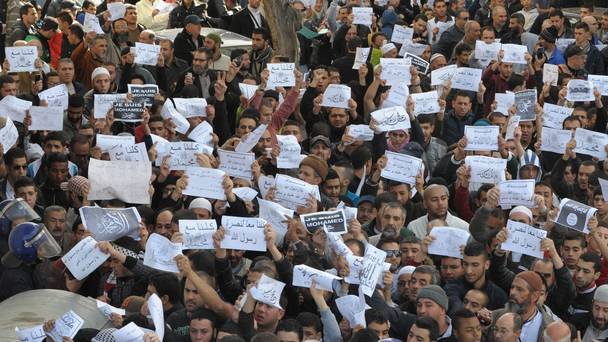

Protests against Charlie Hebdo have taken place in several African countries.
More protests took place throughout the Muslim world after the satirical magazine Charlie Hebdo once again highlighted a cover cartoon that was deliberately offensive to Islam.
The magazine’s office was attacked and 12 staff members killed on Jan. 7. According to French police, two brothers of Algerian descent, Cherif and Said Kouachi, who had lived their lives in the impoverished suburbs outside of Paris, were responsible. They were killed soon after in a shootout with police. Amedy Coulibaly, a French citizen of West African origin, was killed along with four other people on Jan. 9 in what police said was a hostage-taking episode linked to the magazine shootings.
Since these events, the French government under François Hollande has intensified its repressive apparatus, targeting largely African, Middle Eastern and Muslim communities in France.
Dozens of Muslims have been arrested by police and intelligence services.
The official French position, along with their allies in Europe and North America, is that the so-called “ideology of radical Islam” is the central problem fomenting terrorist attacks. There has been very little discussion in the corporate media about the overall social conditions facing Africans, Arabs and Muslims in France or on the African continent.
Muslims demonstrate across Africa
Demonstrations have taken place in Algeria, Senegal, Sudan, Mauritania and Niger, where a French cultural center was attacked on Jan. 16. All these states have large Muslim populations, and many viewed the cover of the latest Charlie Hebdo magazine as an affront to their religious beliefs.
In addition to the demonstrations in Africa, similar protests have occurred in Yemen, Pakistan, Turkey, Jordan and other countries. In many of these demonstrations people who gathered outside French embassies clashed with police.
In Niger, at least 10 people were killed during three days of demonstrations during Jan. 16-18. In Niger’s second-largest city, Zinder, a French cultural center was damaged during protests.
Other demonstrations were reported in regional cities like Maradi, 360 miles east of Niamey, the capital, where two churches were struck by arson. Another church and a residence of the foreign minister were said to have been torched in the eastern town of Goure.
Niger has a population of 17 million, most of whom are Muslims. A former French colony, Niger is rich in mineral resources, mainly uranium, but the people are poor. The uranium mines are largely controlled by Areva, a French multinational based in Paris.
Niger has U.S. and French military contingents stationed on long-term missions. The U.S. Africa Command operates a drone station inside the country.
The French and the U.S. are using Niger to carry out a counter-insurgency war against what these imperialist states describe as terrorist groups that have established bases in northern Mali. The military presence of Washington and Paris in no way benefits the masses of working people, farmers and youth in Niger.
France distorts freedom of expression, liberty
France, a longtime colonial and neocolonial power in Africa, is upholding the right of satirical publications to insult oppressed groups inside France, while it carries out policies of discrimination and oppression against those whose ancestry is rooted in Africa and the Middle East.
The domestic racism in France is a direct outgrowth of capitalist policies of slavery, colonialism and imperialism in operation since the 18th century. Due to the legacy of postcolonial French domination and exploitation of its former colonies, societal development has been stifled, creating the conditions that drive the large-scale migration of African people.
At the same time, the overall economic conditions in France itself are by no means good. Unemployment has hovered over 10 percent for many years, and successive regimes have failed to bring down the high rates of joblessness and poverty which are greatest among people of color.
Consequently, the character of immigration policy, the existence of racism and anti-Islamic bigotry, and the failure of integration or assimilation cannot be overlooked when analyzing the current social crisis in France. This is coupled with the disastrous foreign policy of Paris, which in recent years has bombed Libya and also provided material and political support to the rebels fighting against the government of President Bashar al-Assad in Syria.
The French government is well aware that its citizens have been recruited to serve in rebel groups that France claims to oppose in both Iraq and Syria. In fact, Hollande has admitted that his government has supplied Syrian rebels with arms to fight the secular government.
These policies in Libya and Syria are compounded by French interventions in African states over the last few years — in Gabon, the Central African Republic, Libya, Ivory Coast, Niger, Mali, Chad, Somalia, Djibouti and other states. Despite its proclaimed altruistic motivations in Africa, the result of this unwarranted interference in the internal affairs of these countries has caused further instability and economic stagnation.
Boston, April 20, 2025 The leadership of the Democratic Party nationally and especially in Massachusetts…
Hamas – Islamic Resistance Movement made the following call, “Gaza cries out to you —…
The centennial of the birth of Malcolm X, also known as El-Hajj Malik El-Shabazz, is…
In a courageous act of solidarity with the Palestinian people, a Moroccan port workers’ union…
Buffalo, New York A large group of demonstrators marched on the Buffalo ICE (U.S. Immigration…
In the 1950s, when Japan and much of Europe was in ruins, the U.S. accounted…